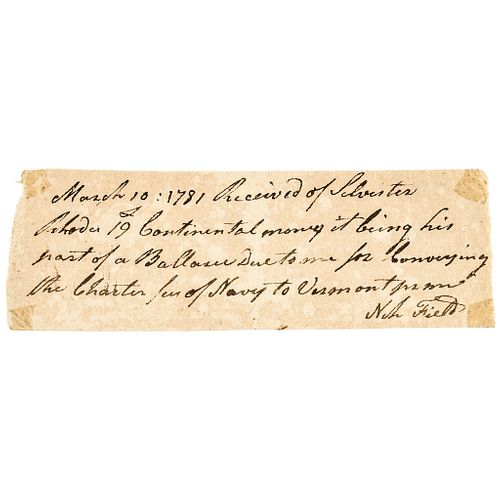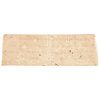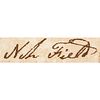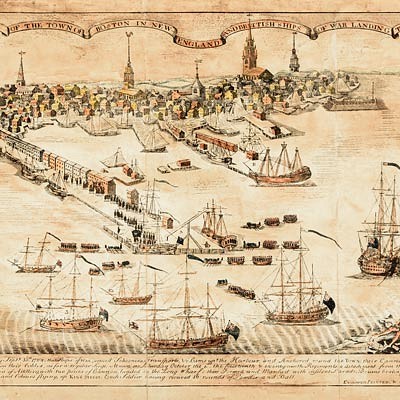Rare 1781 VERMONT Revolutionary War Navy Related Payment in Continental money!
Lot 158
Categories
Estimate:
$700 - $900
Absentee vs Live bid
Two ways to bid:
- Leave a max absentee bid and the platform will bid on your behalf up to your maximum bid during the live auction.
- Bid live during the auction and your bids will be submitted real-time to the auctioneer.
Bid Increments
| Price | Bid Increment |
|---|---|
| $0 | $10 |
| $200 | $20 |
| $300 | $25 |
| $500 | $50 |
| $1,000 | $100 |
| $2,000 | $200 |
| $3,000 | $250 |
| $5,000 | $500 |
| $10,000 | $1,000 |
| $20,000 | $2,000 |
| $30,000 | $2,500 |
| $50,000 | $5,000 |
| $100,000 | $10,000 |
| $200,000 | $20,000 |
| $300,000 | $25,000 |
| $500,000 | $50,000 |
About Auction
By Early American History Auctions
Mar 20, 2021
Set Reminder
2021-03-20 12:00:00
2021-03-20 12:00:00
America/New_York
Bidsquare
Bidsquare : Autographs-Colonial-Political-Americana
https://www.bidsquare.com/auctions/early-american-history-auctions/autographs-colonial-political-americana-6509
330 Lots of Rare, Historic Autographs, Americana, Civil War Era, George Washington, Abraham Lincoln, Slavery & Black History, Revolutionary War Era, Colonial America, Federal Period, War of 1812, Colonial Currency, Indian Peace Medals & more... Early American History Auctions auctions@earlyamerican.com
330 Lots of Rare, Historic Autographs, Americana, Civil War Era, George Washington, Abraham Lincoln, Slavery & Black History, Revolutionary War Era, Colonial America, Federal Period, War of 1812, Colonial Currency, Indian Peace Medals & more... Early American History Auctions auctions@earlyamerican.com
- Lot Description
American Revolution
1781 Commander Sylvester Rhodes Revolutionary War Privateer Payment for Conveying the Charter Payment for Continental Navy
March 10, 1781-Dated Revolutionary War Period, Manuscript Document Receipt Signed, "Nich(olas) Field," Conveying the Charter fees of Navy to Vermont per war(ant).", Very Fine.
This original Revolutionary War Period Manuscript Document measures about 6.5" x 2.25". It is well written and easily readable with light traces of prior hinge mount traces at each corner tip. Overall, boldly and clearly written in deep rich brown ink on period laid paper. Being an unusual payment receipt in "Continental money" and mentioning noted American Privateers. It reads, in full:
"March 10, 1781 - Received of Silvester (sic) Rhodes (its symbol) "$"19 Continental money it being his part of a Ballance (sic) Due to me for Conveying the Charter fees of Navy to Vermont per war(ant). - (Signed) Nich(olas) Field".
Nicholas Field is listed as having been taken prisoner by the British of the Privateer Ship "Carolina" was placed into The Old Mill Prison at Plymouth in England on either the charge of 'treason' or 'piracy'.
Sylvester Rhodes (1742-1782), mentioned for this payment, was the Sailing-Master of the American Privateer "Chance." Rhodes was descended from one of the early settlers of New England, named Zachary Rhodes, who came from England to Plymouth, Massachusetts at an early day, and subsequently settled, with his wife Joanna, daughter of William Arnold, one of the original settlers of the State, at Pawtuxet, Rhode Island. He entered the public service at an early period of the American Revolutionary War and he continued to serve his country, sometimes at sea, at others ashore, until his death in 1782. Rhodes was with American Revolutionary War Continental Navy Commander Commodore Abraham Whipple on his first cruise. For Commodore Whipple, it proved to be one of his most incredible achievements that he destroyed the British Customs Schooner "HMS Gaspee.
Vermont actually played an important Naval role during the Revolutionary War, including the Battle of Lake Champlain. After the British Campaign of 1777, the British controlled Lake Champlain for the duration of the Revolutionary War. The British naval fleet provided transportation and support for raids into the Champlain and Mohawk Valleys from 1778 to 1780, and served as supply vessels for the British posts at the northern end of the lake. When the Revolutionary War ended in 1783, the British fleet was laid up at St. John's, Newfoundland, except for the Schooner Maria, which continued to patrol the northern end of the lake. More research should be accomplished on this intriguing Vermont Naval related document.
Sylvester Rhodes was with American Revolutionary War Continental Navy Commander Commodore Abraham Whipple on his first cruise. For Commodore Whipple, it proved to be one of his most incredible achievements that he destroyed the British Customs Schooner "HMS Gaspee."
The Gaspee Affair was a significant event in the lead-up to the American Revolution. HMS Gaspee was a British Customs Schooner that had been enforcing the Navigation Acts in and around Newport, Rhode Island in 1772. It ran aground in shallow water while chasing the packet Ship Hannah on June 9 near Gaspee Point in Warwick, Rhode Island. A group of men led by Abraham Whipple and John Brown attacked, boarded, and torched the ship.
The event increased hostilities between the American colonists and British officials, following the Boston Massacre in 1770. British officials in Rhode Island wanted to increase their control over trade-legitimate trade as well as smuggling-in order to increase their revenue from the small colony. But Rhode Islanders increasingly protested the Stamp Act, the Townshend Acts, and other British impositions that had clashed with the colony's history of rum manufacturing, maritime trade, and Slave trading.
This event and others in Narragansett Bay marked the first acts of violent uprising against the British Crown's authority in America, preceding the Boston Tea Party by more than a year and moving the Thirteen Colonies as a whole toward the war for Independence.
Rhodes, as Prizemaster, carried into Boston the First "Prize" a British Ship captured by that officer in the military operations in Rhode Island, he also served with honor and usefulness.
He was subsequently one of the eight Prize-Masters on board the Privateer General Washington, which sailed in May, 1780; and he was at the head of the list of Prize-Masters on board the Privateer Stlitariiu, when she sailed from Boston and was captured and carried to New York, in 1781.
In 1782, he was Sailing-master on board the Privateer Chance, of which his brother-in-law, Daniel Aborn, was the commander; and, with the crew of that vessel, he was again carried to New York, and confined on board the British Prison Ship the Jersey.
When the crew of the Chance was exchanged, it is supposed that Sailing-master Rhodes was among those invalids on Blackwell's Island who were left in captivity,3 and his brother-in-law, Captain Aborn-, subsequently renewed his exertions to obtain his release, as he had done that of his shipmates.
As Rhodes was an officer in the army, as well as on the Privateer, the enemy refused to release him as they had released his associates- man for man ;' and not until his father had secured the interposition of a family in Newport whose connections in New York were friendly to the Government, was any progress made in effecting his discharge, notwithstanding the very feeble state of his health.
At length, through the kind offices referred to, his parole was secured, and Captain Aborn proceeded to New York to convey him to his family ; hut so far had disease performed its work, he never saw, in life, the home and family which were so dear to him. He died on board the cartel, while on her passage through the Sound, on the third of November, 1782; and his body having been taken nshore at New Haven, it was interred at that place.
Our Auction Contents:
Black History & Slavery: (Lots 1 - 63)
Abraham Lincoln Related: (Lots 64 - 74)
Historic Autographs: (Lots 75 - 235)
Colonial America: (Lots 236 - 261)
Revolutionary War: (Lots 262 - 304)
George Washington Related: (Lots 305 - 306)
Early American Guns & Weapons: (Lots 307 - 318) - Shipping Info
-
Early American provides in-house worldwide shipping. Please contact us directly if you have questions about your specific shipping requirements.
-
- Buyer's Premium



 EUR
EUR CAD
CAD AUD
AUD GBP
GBP MXN
MXN HKD
HKD CNY
CNY MYR
MYR SEK
SEK SGD
SGD CHF
CHF THB
THB













